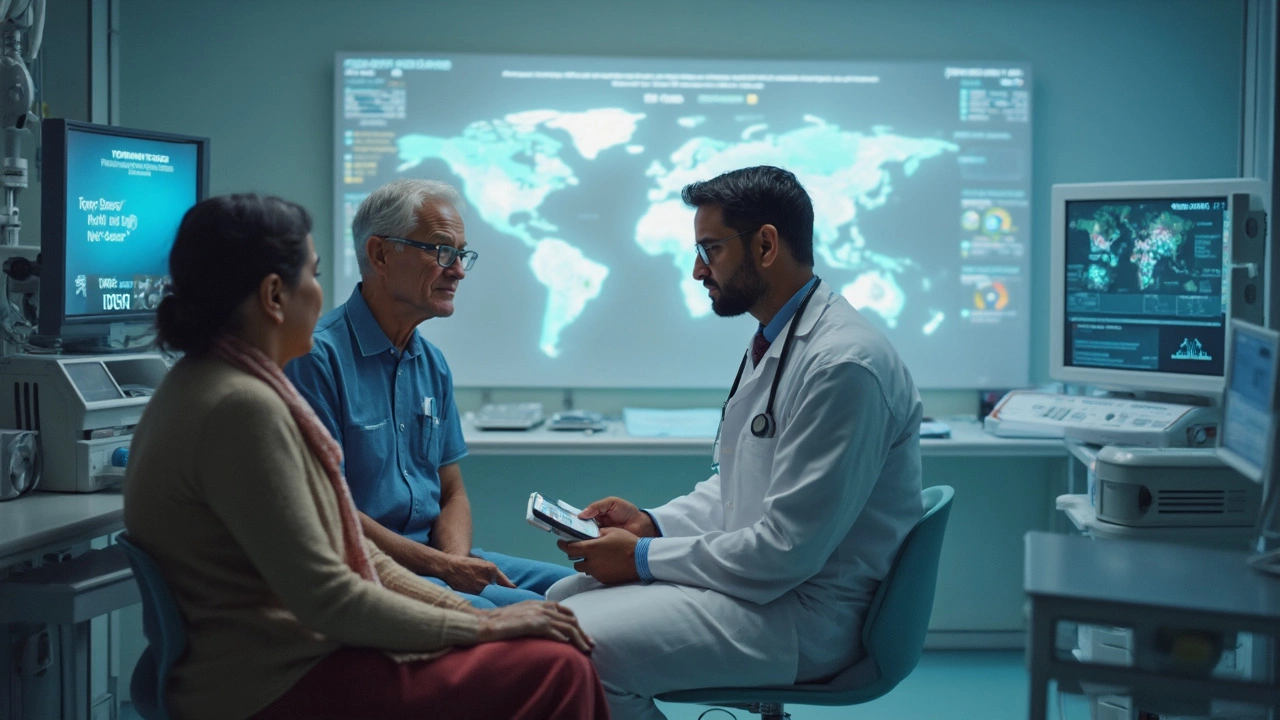If you asked random people about the biggest health issue out there, most would guess cancer or maybe diabetes. But stats from the World Health Organization keep repeating the same story every year: heart disease—specifically, ischemic heart disease—is still the world's number one killer. It knocks out more people than any other sickness, hands down. That's why it shapes not just local health systems, but where people travel for care.
The crazy part? Loads of folks are jumping on planes just to get better heart treatment. Some say the wait times back home are endless. Others can't afford local surgery prices or want the latest tech. This rush for heart procedures—everything from bypasses to valve replacements—is fueling massive growth in medical tourism hubs. They're not just catering to rich tourists, either. They're working overtime to offer safe, affordable options to regular families who can't get what they need nearby.
- Why Heart Disease Takes the Top Spot
- How Heart Disease Impacts Travel Decisions
- Hospitals Leading in Cardiac Care Abroad
- What Patients Look for in Medical Tourism
- Risks and Safety in Overseas Heart Treatment
- Tips for Getting the Best Care Abroad
Why Heart Disease Takes the Top Spot
Heart disease, usually called ischemic or coronary artery disease, leads the list for a reason—it kills more people worldwide than any other sickness. According to the World Health Organization, heart disease was responsible for about 16% of all global deaths as of 2023. That’s a bigger number than diabetes, cancer, or infectious diseases. So when people talk about the number 1 sickness in the world, this is the one they mean.
The reasons run deeper than just genetics or family history. The real drivers are pretty familiar: unhealthy food, lack of movement, stress, and smoking. Even in places where rapid urbanization brings more jobs and gadgets, it also brings more processed food, pollution, and sitting for hours every day. All these add up to high blood pressure, clogged arteries, and in the worst cases, life-threatening heart attacks.
- High blood pressure is called the "silent killer" for a reason—it often has no symptoms until it’s too late.
- Obesity rates are climbing everywhere, and it’s a major risk factor for heart issues.
- More people now have diabetes than ever before, which pairs up with heart trouble far too often.
And here’s another punch: heart disease doesn’t care about age as much as it used to. More folks in their 30s and 40s are showing up with heart problems, mostly because unhealthy habits start early.
| Leading Cause of Death | Annual Deaths (Millions, 2023 est.) |
|---|---|
| Heart Disease | ~17.9 |
| Stroke | ~6 |
| Cancer | ~9.7 |
So the bottom line is, heart disease stays on top because it hits every continent and all sorts of people. It’s a giant problem that’s tough to dodge, which is why so many are looking for the best treatment they can get—even if that means going halfway across the world.
How Heart Disease Impacts Travel Decisions
When it comes to heart disease, a whole lot of people face tough choices about where to get treatment. If you’re living in a country where the health system is overloaded or waiting lists are insane, you might end up waiting months—sometimes over a year—for a simple stent or bypass. In places like the US, even with insurance, the out-of-pocket costs can hit hard. All this stress and time pressure pushes people to look beyond their own backyard for care.
Take this: More than 7 million people travel every year for medical care, and a chunk of them are looking for help with heart disease. Heart attacks don’t wait around for paperwork or hospital call-backs. In India, Thailand, and Turkey, heart surgeries can cost a quarter of what they do in the US or Europe. Not only are they cheaper, but a lot of hospitals abroad have killer cardiac units with doctors trained in major Western centers.
There are some must-haves most folks look at before jumping on a plane for heart disease treatment:
- How quickly they can get a slot for surgery or procedures
- The reputation of the hospital and its heart center
- Whether doctors are board certified or have overseas experience
- Real-life reviews from people who’ve done it before
- Money savings, even after paying for travel and hotel
Here’s a look at what it can cost and how long people might wait in a few countries:
| Country | Coronary Bypass Cost (USD) | Average Wait Time |
|---|---|---|
| USA | $80,000 | 2-8 weeks |
| India | $7,000 | 1-2 weeks |
| Thailand | $15,000 | 1-3 weeks |
| Turkey | $13,000 | 1-2 weeks |
| UK | Free (NHS) | 3-12 months |
For people who can’t afford to wait or need better odds, leaving home is a no-brainer—even if it means heading halfway across the world. When it’s literally life and death, speed, quality, and cost quickly become the top priorities in travel plans.
Hospitals Leading in Cardiac Care Abroad
If you’ve heard about people flying out for heart treatment, it usually comes down to a handful of well-known hospitals. These spots get tons of patients not just for lower costs, but because their results are top-notch. Think of places like Bumrungrad International Hospital in Bangkok, Fortis Escorts Heart Institute in Delhi, and Houston Methodist in the US. Each one has a reputation for handling complicated heart disease cases with skill and high-tech tools.
Let’s break it down. Bumrungrad in Thailand handles more than a million patients every year, and a good chunk are international. Their heart center is famous for advanced surgeries, like beating heart bypasses, which mean faster recovery for patients. Meanwhile, India’s Fortis network has treated over 200,000 heart patients, and they often pioneer techniques like minimally invasive valve repair. These hospitals don’t just have fancy gear—they also snag top heart doctors who’ve trained at places like the Cleveland Clinic in the US.
You might be wondering about actual numbers. Check out this quick snapshot:
| Hospital | Country | International Patients/Year | Highlight |
|---|---|---|---|
| Bumrungrad International | Thailand | 520,000 | Robotic assisted heart surgery |
| Fortis Escorts Heart Institute | India | 10,000+ | Minimally invasive cardiac procedures |
| Anadolu Medical Center | Turkey | 20,000+ | Hybrid operating rooms for heart care |
Most of these hospitals speak multiple languages, offer package deals, and handle all the paperwork up front. You don’t need to be a celebrity to get a spot—just someone looking for better or quicker help. Before you pick a hospital for cardiac care, it pays to check if they’re accredited by groups like JCI (Joint Commission International). That’s usually a sign they meet tough quality rules, just like top hospitals in the US or Europe do.

What Patients Look for in Medical Tourism
When it comes to picking a destination for medical tourism, heart patients don’t mess around. Whether they're traveling for heart surgery, stents, or just advanced tests, most people have the same must-haves on their list.
- Cost: Price matters a ton. Some folks find heart procedures up to 70% cheaper in countries like India, Thailand, or Turkey than at home.
- Quality of Care: Nobody wants shortcuts with heart health. Patients dig into clinic reviews, look for doctors with internationally recognized experience, and check if hospitals are certified by Joint Commission International (JCI) or have similar stamps of approval.
- Access to Latest Technology: Robotic surgery, minimally invasive tools, and high-end imaging are a big deal. Top medical tourism spots actually advertise their advanced gear because patients ask about it up front.
- No Waiting Lists: In places like Canada or the UK, people can wait months for heart surgery. Many look abroad just for the chance to fix things right away.
- Language and Support: Good hospitals make sure staff speak English (and sometimes multiple languages) so nothing gets lost in translation, whether that’s understanding a diagnosis or the risks during recovery.
There’s also the backup plan—good aftercare and emergency support. People want to know: If something goes wrong, can that place handle it? The top hospitals answer this upfront with clear care plans for before and after surgery.
Here’s a quick snapshot of what people usually focus on when booking care overseas:
| Factor | Why It Matters |
|---|---|
| Price | Lowers out-of-pocket expenses |
| Doctor Experience | Better results, fewer risks |
| Hospital Accreditation | Safety and quality benchmarks |
| Tech Level | Improved surgery outcomes |
| Communication | Reduces mistakes, anxiety |
Bottom line: heart patients aren’t just shopping for bargains—they’re comparing, researching, and asking tough questions. Getting the best out of medical tourism means looking for a blend of price, safety, skill, and comfort every step of the way.
Risks and Safety in Overseas Heart Treatment
Packing your bags for heart care in another country definitely saves money and cuts wait times, but let's not pretend there aren't risks. The fact is, not every hospital or clinic treating heart disease overseas is held to the same standards you'd see in the US, Canada, or the UK. Infection rates, the experience of the medical team, and even how well equipment is kept up can vary a ton from place to place.
One issue a lot of people forget is follow-up care. Going home right after heart surgery isn't ideal. Complications sometimes show up a week or two after the procedure when you've already flown back to your home country. That makes it way harder to get help quickly from the team that did your surgery.
Another thing several studies flagged: some medical tourism hotspots can have higher rates of hospital infection or antibiotic resistance than what you’d find in your own country. Not saying every hospital is risky, but you need to check for international certifications like Joint Commission International (JCI). This stamp means the clinic's quality is in line with tough global rules.
| Country | Certified Cardiac Centers* | Average Cost (CABG) |
|---|---|---|
| India | 40+ | $5,000 - $7,000 |
| Thailand | 20+ | $15,000 - $22,000 |
| Turkey | 15+ | $12,000 - $18,000 |
| USA | 150+ | $70,000 - $200,000 |
*JCI-certified hospitals offering coronary artery bypass graft surgery
You’ve also got language barriers, which can mess with getting clear instructions on meds or recovery steps. Some folks also run into trouble with health insurance refusing to cover care or complications once they’re back home because the surgery was done outside approved networks.
- Look up hospital and surgeon ratings—don’t just trust marketing.
- Ask if the facility is JCI or NABH accredited.
- Request a full written treatment and recovery plan before you leave home.
- Make sure you can get all your records in English or your preferred language.
- Have a local doctor lined up for aftercare at home in case anything pops up.
Taking these steps doesn’t totally erase risk, but they give you a much better shot at getting safe, top-notch care when you’re traveling for heart disease treatment.
Tips for Getting the Best Care Abroad
There's real peace of mind when you know your treatment is in good hands, especially if you're traveling for something as major as heart surgery. Before you even start packing, arm yourself with these practical tips. Finding the top spot for heart disease treatment abroad isn't about luck—it's all about smart planning.
1. Research the Hospital's Track Record
Not all hospitals are created equal when it comes to cardiac care. Look for ones accredited by bodies like Joint Commission International (JCI). Hospitals in places like Thailand, India, and Turkey are racking up awards for cardiac surgery these days. According to the International Medical Travel Journal, "JCI-accredited centers report 30-40% lower post-surgery complications compared to non-accredited hospitals."
"International accreditation ensures hospitals meet strict quality and safety standards, which is crucial for complex procedures like heart surgery." — International Medical Travel Journal
2. Vet the Docs
The best facilities post their surgeons' education and case histories online. Make sure your doctor has real experience with your specific procedure. Don’t be shy—email or video chat with them if you can.
3. Sort Out Aftercare
A hospital may seem great on paper, but what happens after you leave? Ask about aftercare support, rehab, and coordination with your home doctor. Many good clinics assign patient managers who help bridge that gap.
4. Break Down the Real Costs
A fancy package price isn’t the whole story. Watch out for hidden fees like anesthesia, post-op meds, or extra nights in the hospital. Compare everything in writing, not just the headline price.
| Country | Avg. Cost of Bypass Surgery (USD) | JCI-Accredited Hospitals |
|---|---|---|
| India | $7,900 | 38 |
| Thailand | $15,000 | 58 |
| Turkey | $11,500 | 32 |
| USA | $78,000 | 200+ |
Source: Patients Beyond Borders Medical Travel Guide, 2024
5. Check What Your Insurance Covers
Some insurance plans cover certain international procedures. Always check the fine print or talk to your insurance agent. There are also travel health insurance add-ons specifically for medical tourism.
6. Ask Other Patients
Search for reviews or forums with real stories—not just what clinics publish. Some patients even post step-by-step guides after returning home, which can be a goldmine of tips. Reddit, Trustpilot, and Facebook groups can be way more helpful than just glossy brochures.
Sure, chasing better healthcare travel choices for number 1 sickness—heart disease—may take extra effort, but being picky can literally save your life. Do your homework, double check everything, and get the care you’d expect for someone you love.






